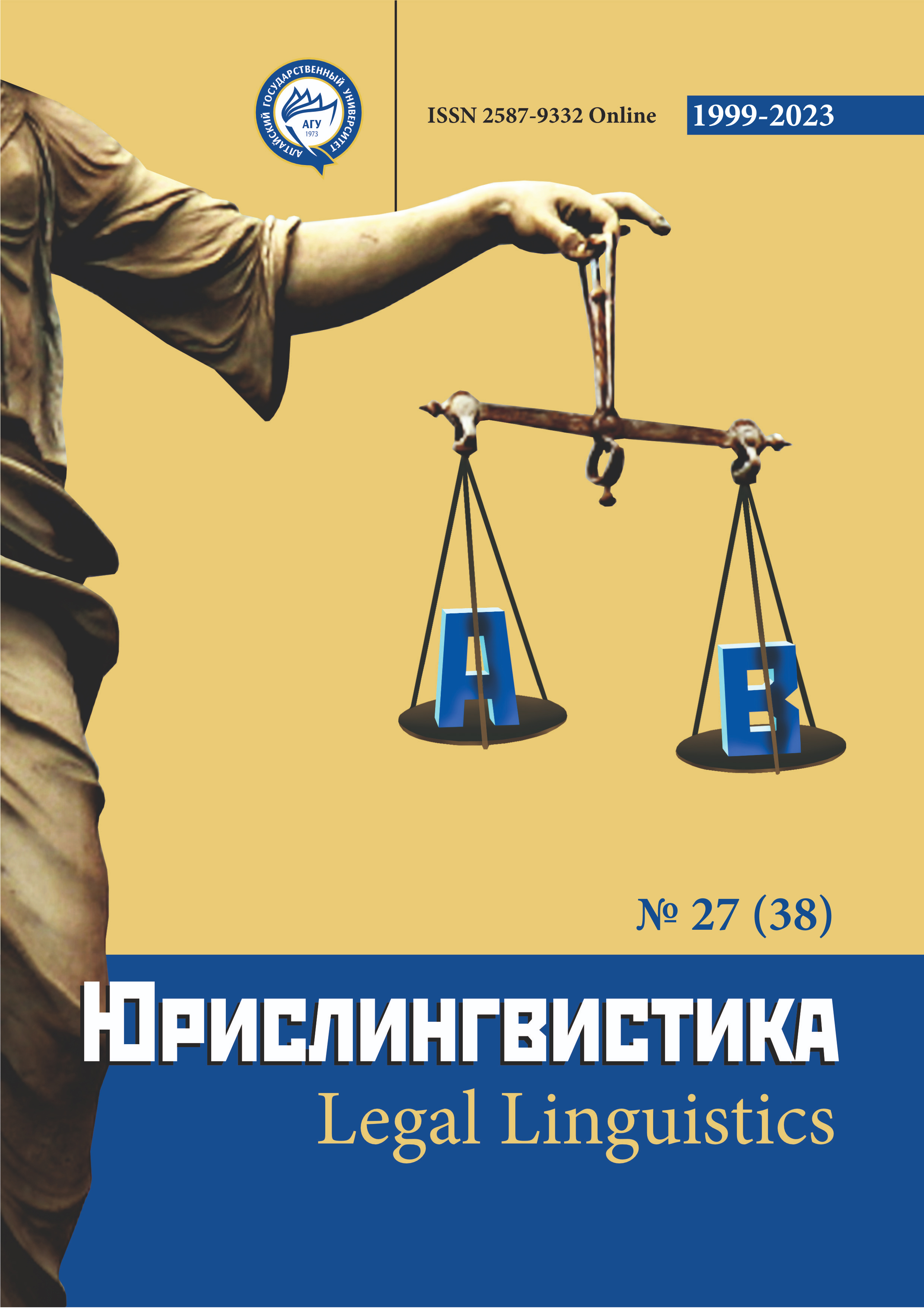Linguistic Rules of Legal Technique: Reasonableness, Obligation, Efficiency
УДК 340.134 ББК 67.0
Abstract
The article discusses the requirements that are necessary to simplify the text of the law and increase its intelligibility. The main attention is paid to the rules for the use of contextual and generally accepted abbreviations, because they can significantly reduce the volume of the law, save it unnecessary repetitions and make it more understandable. Examples of inconsistent use of contextual abbreviations by the legislator are given, as well as examples of texts in which it would be appropriate to use abbreviations. It is concluded that the effectiveness of technical legal rules is possible only if they are reasonable and obligatory to comply to. It is proved that the problem of the complexity of the modern Russian legal language needs a planned state policy, covering the reform of both the rules of legislative technique and the legislative procedure itself. As tools to assess the effectiveness of these rules and support their observance, it is proposed to establish a mandatory automatic check of bills for syntactic complexity, as well as to involve focus groups to assess the level of readability of texts and the comprehensibility of the terms and abbreviations used in them. The study is financially supported by the Russian Science Foundation, project № 21-18-00484, https://rscf.ru/project/21-18-00484/.
Downloads
Metrics
References
Белов С. А., Гулида В. Б. Язык юридических документов: сложности понимания / Acta Linguistica Petropolitana. Труды института лингвистических исследований. - 2019. - Т. 1. - № 15. - С. 56-103.
Голев Н. Д. Лингвистические тупики юридической техники / Юрислингвистика. - 2007. - № 8. - С. 92-104.
Давыдова М. Л. «Умное регулирование» как основа совершенствования современного правотворчества / Журнал российского права. - 2020. - № 11. - С. 14-29.
Давыдова М. Л. Нормативность юридической техники: к вопросу о механизме действия правотворческих правил и средств / Юридическая техника. - 2012. - № 6. - С. 154-158.
Кучаков Р., Савельев Д. Сложность правовых актов в России: Лексическое и синтаксическое качество текстов. Под редакцией Д. Скугаревского (Серия «Аналитические записки по проблемам право- применения»). СПб, 2018. URL: https://enforce.spb.ru/images/analit_zapiski/memo_readability_2018_web.pdf
Методические рекомендации (1) по лингвистической экспертизе законопроектов. М., 2013. URL: http://duma.gov.ru/media/files/9Sc61P4yf42i9INdk8GHYItzqb3hwMEF.pdf
Методические рекомендации (2) по реализации принципов открытости в федеральных органах исполнительной власти (утв. протоколом заочного голосования Правительственной комиссии по координации деятельности открытого правительства от 26.12.2013 N АМ-П36-89пр)
Методические рекомендации по юридико-техническому оформлению законопроектов (утв. Аппаратом Государственной Думы Федерального Собрания Российской Федерации) (редакция 2021 г.)
Научно-информационный «Орфографический академический ресурс АКАДЕМОС» Института русского языка им. В. В. Виноградова РАН. URL: https://orfo.ruslang.ru/
Оценка сложности языка законов (Анализ существующих юридико-технических и лингвистических подходов к разработке проектов законодательных актов, выработка предложений по их корректировке). М., 2020. URL: https://icef.hse.ru/data/2020/03/18/1567931010/%D0%9E%D1%86%D0%B5%D0%BD%D0%BA%D0%B0%20%D1%81%D0%BB%D0%BE%D0%B6%D0%BD%D0%BE%D1%81%D1%82%D0%B8%20z%D0%B7%D0%B0%D0%BA%D0%BE%D0%BD%D0%BE%D0%B2.pdf
Савельев Д. А. Исследование сложности предложений, составляющих тексты правовых актов органов власти Российской Федерации / Право. Журнал Высшей школы экономики. - 2020. - № 1. - С. 50–74.
Уильямс К. Юридический английский и простой английский: изменения и дополнения / Юрислингвистика. - 2012. - № 1 (12). - С. 191-204.
Gunningham N., Sinclair D. Smart regulation. In Drahos P, editor, Regulatory Theory: Foundations and applications. Canberra, Australia. 2017. Pp. 133-148.
Martínez E., Mollica F., Gibson E. Poor writing, not specialized concepts, drives processing difficulty in legal language / Cognition. – Vol. 224. – 2022. 105070, ISSN 0010-0277, https://doi.org/10.1016/j.cognition.2022.105070. URL: https://www.sciencedirect.com/science/article/pii/S0010027722000580
OPC’s Guide to Reducing Complexity in Legislation. The Office of Parliamentary Counsel. Austrralian Government. June, 2016. URL: https://www.opc.gov.au/sites/default/files/reducingcomplexity_0.pdf
PCO Plain Language Standard. Parliamentary Councel Office. New Zealand. URL: https://www.pco.govt.nz/clear-drafting/
Plain English and the Law: the 1987 Report Republished (html) The importance of plain English / The Victorian Law Reform Commission (the official site) Posted on July 14, 2021. URL: https://www.lawreform.vic.gov.au/publication/plain-english-and-the-law-the-1987-report-republished/5-the-importance-of-plain-english/
Principles of Clear Writing. Office of the Federal Register. The U.S. National Archives and Records Administration URL: https://www.archives.gov/federal-register/write/legal-docs/clear-writing.html.
Copyright (c) 2023 Марина Давыдова

This work is licensed under a Creative Commons Attribution 4.0 International License.
The authors, which are published in this journal, agree to the following conditions:
1. Authors retain the copyright to the work and transfer to the journal the right of the first publication along with the work, at the same time licensing it under the terms of the Creative Commons Attribution License, which allows others to distribute this work with the obligatory indication of the authorship of this work and a link to the original publication in this journal .
2. The authors retain the right to enter into separate, additional contractual agreements for the non-exclusive distribution of the version of the work published by this journal (for example, to place it in the university depository or to publish it in a book), with reference to the original publication in this journal.
3. Authors are allowed to post their work on the Internet (for example, in a university repository or on their personal website) before and during the review process of this journal, as this may lead to a productive discussion, as well as more links to this published work (See The Effect of Open Access).











